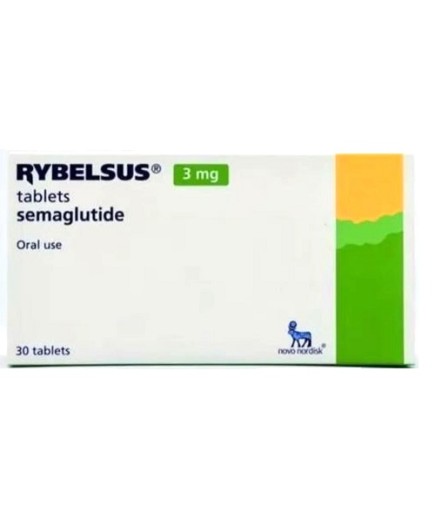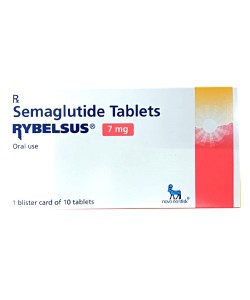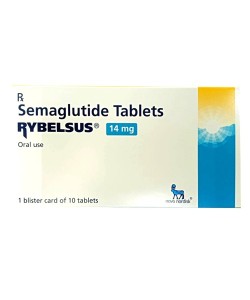Rybelsus 3 mg
- Model: Rybelsus 3 mg
- SKU: RBLS3
- Active Ingredient: Semaglutide
- Treatment: Type 2 Diabetes
- Availability: In Stock
Rybelsus 3 mg tablet is an FDA-approved medicine that contains semaglutide and is used for type 2 diabetes treatment. It helps to control blood sugar levels.
Rybelsus 3 mg Overview
| Product Name: | Rybelsus 3 mg |
| Generic Name: | Semaglutide 3 mg Pill |
| Active Ingredient: | Semaglutide |
| Manufacturer: | NOVO NORDISK INDIA PVT LTD |
| Drug Class: | Glucagon-like peptide-1 (GLP-1) receptor agonist |
| Strength: | 3 mg |
| Treatment: | Type 2 Diabetes, Weight Loss |
| Price: | $799 |
| Delivery Time: | 10 to 12 Days |
| Delivered Countries: | USA, UK, Canada, Australia, China, Japan, and South Africa |
What is Rybelsus 3 mg?
Rybelsus 3 mg is an oral medication used to treat type 2 diabetes and weight loss.
Rybelsus 3 mg tablet contains semaglutide, which helps to manage blood sugar levels in adults with type 2 diabetes mellitus.
Rybelsus 3 mg is a glucagon-like peptide-1 (GLP-1) receptor agonist that has been proven in tests to help in weight loss, although it is not an FDA-approved weight loss treatment.
Semaglutide pills are used once a day, together with diet and exercise.
Rybelsus mechanism of action
Rybelsus works by:
Stimulating Insulin Secretion: It enhances the release of insulin in response to high blood sugar levels.
Reducing Glucagon Secretion: It lowers the amount of glucagon, a hormone that increases blood sugar levels.
Slowing Gastric Emptying: It slows down the rate at which food leaves the stomach, leading to a slower absorption of glucose into the bloodstream.
What is Rybelsus 3 mg used for?
Rybelsus 3 mg is an oral medication primarily used for the treatment of type 2 diabetes. It contains semaglutide, which is a GLP-1 (glucagon-like peptide-1) receptor agonist. Here are its primary uses:
1. Blood Sugar Control
Primary Benefit: Rybelsus 3 mg is highly effective in lowering blood glucose levels in patients with type 2 diabetes.
Improved HbA1c Levels: Helps reduce HbA1c (glycated hemoglobin), a marker of long-term blood sugar control.
Fasting and Postprandial Glucose: Lowers both fasting blood glucose levels and postprandial (after meal) glucose spikes.
2. Weight Loss
Secondary Benefit: Rybelsus has been associated with weight loss, which is beneficial for many patients with type 2 diabetes who are often overweight or obese.
Appetite suppression: Reduces hunger and food intake.
Increased Satiety: Promotes feelings of fullness, leading to reduced calorie consumption.
Clinical Evidence: Studies have shown that patients taking Rybelsus experience significant weight loss compared to those on a placebo.
Cardiovascular Benefits
Cardioprotective Effect: Rybelsus may offer cardiovascular benefits, especially important for patients with type 2 diabetes who are at higher risk of cardiovascular diseases.
Reduced Cardiovascular Events: This may help lower the risk of heart attack, stroke, and other cardiovascular events.
Blood Pressure and Lipids: May contribute to slight reductions in blood pressure and improvements in lipid profiles.
Gastrointestinal Health
Potential Benefit: The slowing of gastric emptying can be beneficial in managing other gastrointestinal conditions.
Gastroparesis Management: This may help in conditions where delayed gastric emptying is advantageous.
Quality of Life
Enhanced Well-being: Many patients report improved quality of life due to better blood sugar control and weight loss.
Energy Levels: Better management of diabetes symptoms can lead to increased energy and physical activity.
Mental Health: Weight loss and improved health metrics can positively impact mental health and self-esteem.
What is Type 2 diabetes?
Type 2 diabetes is a chronic medical condition characterized by high levels of glucose (sugar) in the blood. It is the most common form of diabetes and typically develops in adults, though it is increasingly being diagnosed in younger populations, including children and adolescents.
Type 2 diabetes symptoms
Thirst and frequent urination: Excess glucose pulls fluid from tissues.
Increased hunger: Cells can’t use glucose effectively.
Fatigue: lack of energy due to glucose issues.
Blurred vision: fluid changes in the eyes.
Slow-healing sores: impaired healing and frequent infections.
Unexpected weight loss: The body breaks down fat and muscle.
Dark skin patches: insulin resistance (acanthosis nigricans).
Numbness or tingling: nerve damage in the extremities.
Yeast infections: High sugar levels promote growth.
Itchy, dry skin: poor circulation and high glucose.
How do I use Rybelsus 3 mg tablets?
Follow all guidelines on your prescription label and read all medication guidance when taking the Rybelsus 3 mg pill as directed by your doctor. Rybelsus is often started at a low dose and gradually increased every four weeks to thirty days. Follow your doctor's prescription directions carefully.
Rybelsus 3 mg tablets are normally taken once a day by mouth.
Take Rybelsus tablets promptly in the morning and at least 30 minutes before eating or drinking anything.
Take the semaglutide tablet with a modest amount of water (4 ounces maximum).
Swallow the pill whole, without crushing, chewing, or breaking it.
After 30 minutes, you may eat, drink, or take other oral medications.
Do not use two separate brands of semaglutide at the same time.
Rybelsus 3 mg dosage
Dosage for Type 2 Diabetes
For type 2 diabetes, Rybelsus is typically initiated at a lower dose to minimize gastrointestinal side effects and gradually increased to achieve optimal blood sugar control.
Starting Dose: The recommended starting dose is 3 mg once daily.
Titration: Depending on the individual's response and tolerability, the dose may be increased after 4 weeks to 7 mg once daily to further improve glycemic control.
Maintenance: Some patients may benefit from a maximum dose of 14 mg once daily, depending on their response and physician's recommendation.
Dosage for Weight Loss
While Rybelsus is not FDA-approved specifically for weight loss in non-diabetic individuals, clinical trials have explored its potential. The dosing regimen used in these studies may vary slightly from the standard diabetes management protocol:
Initial Dose: Typically, for weight management purposes, Rybelsus may be started at 0.25 mg once daily to assess tolerance and minimize gastrointestinal side effects.
Titration: The dose is then gradually increased over several weeks, with increments up to 2.4 mg once a week being tested in clinical trials for weight loss.
Maximum Dose: The highest studied dose for weight loss purposes is generally 2.4 mg once a week.
Rybelsus 3 mg side effects
Gastrointestinal Effects: These are the most common side effects and may include nausea, vomiting, diarrhea, constipation, and abdominal pain.
Hypoglycemia: Low blood sugar (hypoglycemia) can occur, especially when Rybelsus is used in combination with other medications that lower blood sugar.
Pancreatitis: In rare cases, inflammation of the pancreas (pancreatitis) has been reported. Symptoms include severe abdominal pain that may radiate to the back and nausea/vomiting.
Thyroid Tumors: There is a potential risk of thyroid C-cell tumors, although this risk appears to be higher in rodents than in humans.
Allergic Reactions: Rarely, allergic reactions such as rash, itching, or swelling (especially of the face, tongue, or throat), severe dizziness, or trouble breathing may occur.
Kidney Effects: Some patients may experience changes in kidney function, although severe kidney problems are rare.
Special Considerations Before Taking Rybelsus (Semaglutide) Tablets
Stress, medical conditions, surgery, exercise, alcohol usage, and meal skipping can all have an impact on blood sugar levels.
Hypoglycemia (low blood sugar) might make you feel extremely hungry, disoriented, angry, or unsteady. Eat or drink hard candy, crackers, raisins, fruit juice, or non-diet cola to correct hypoglycemia swiftly. In the event of extreme hypoglycemia, your doctor may prescribe glucagon medications.
If you have frequent signs of high blood sugar (hyperglycemia), such as increased thirst or urine, notify your doctor. Before altering your prescription dose or schedule, consult your doctor.
Diet, exercise, weight control, medical tests, and specific medical attention may also be part of your treatment.
During a protracted illness, you may become dehydrated. If you are unwell with vomiting or diarrhea, or if you eat or drink less than normal, contact your doctor.
Warnings and Precautions
Risk of Thyroid C-Cell Tumors:
If serum calcitonin appears to be higher or thyroid nodules are identified on medical checkups or neck imaging, patients should be examined further.
Pancreatitis:
Patients should be closely monitored for signs and symptoms of pancreatitis (such as prolonged, severe stomach pain that may or may not be accompanied by vomiting). If pancreatitis is possible, quit rybelsus tablets and seek proper medical attention; if confirmed, do not continue taking this medicine.
Diabetic Retinopathy Complications:
During a pooled analysis of semglutide tablet glycemic control trials, patients experienced diabetic retinopathy-related adverse events (4.2% with Rybelsus 3 mg tablet and 3.8% with comparator).
In a 2-year experiment involving patients with type 2 diabetes and high cardiovascular risk, those treated with semaglutide injection experienced greater diabetic retinopathy problems (3.0%) than patients treated with placebo (1.8%).
People with a history of diabetic retinopathy at baseline had a greater absolute risk increase for diabetic retinopathy consequences than individuals without a known history of diabetic retinopathy.
Rapid glucose control improvement has been linked to a transitory exacerbation of diabetic retinopathy. Patients with a history of diabetic retinopathy should be closely watched for any development of the disease.
Hypoglycemia:
Patients taking semaglutide 3 mg tablets may experience an increased risk of hypoglycemia, including severe hypoglycemia. Inform patients who are taking these drugs together of the risk of hypoglycemia and explain to them the signs and symptoms of hypoglycemia.
Acute Kidney Injury:
In patients who take GLP-1 receptor agonists, especially semaglutide, there have been postmarketing cases of acute kidney injury and increasing chronic renal failure, which may sometimes necessitate hemodialysis. Some of these occurrences have been documented in people who do not have underlying renal impairment.
The majority of recorded incidents happened to people who had nausea, vomiting, diarrhea, or were dehydrated. When starting or increasing Rybelsus tablet doses for patients who have experienced severe adverse gastrointestinal reactions, monitor the condition of the kidneys.
Hypersensitivity:
Serious hypersensitivity responses (anaphylaxis, angioedema) have been observed in Rybelsus tablet user patients. If hypersensitivity reactions occur, discontinue the use of semglutide tablets immediately, treat as directed, and monitor until the symptoms decrease.
If the patient has a history of angioedema or anaphylaxis with another GLP-1 receptor agonist, proceed with caution.
Acute Gallbladder Disease:
In GLP-1 receptor agonist studies and postmarketing, acute gallbladder illnesses such as cholelithiasis or cholecystitis have been documented. Cholelithiasis was identified in 1% of participants treated with Rybelsus 7 mg in placebo-controlled trials.
There was no evidence of cholelithiasis in patients who received Rybelsus 14 mg or a placebo. If the condition is considered, gallbladder tests and clinical follow-up are advised.
Contraindications
Rybelsus 3 mg is not recommended for patients who have a personal or family history of medullary thyroid carcinoma (MTC), multiple endocrine neoplasia syndrome type 2 (MEN 2), or who have previously experienced a serious hypersensitivity reaction to semaglutide or any of the excipients in semaglutide pills. Rybelsus pills have been linked to severe hypersensitivity issues such as anaphylaxis and angioedema.
Storage
Rybelsus tablets must be stored at room temperature (68°F to 77°F/20°C to 25°C).
What is Rybelsus 3 mg tablets?
Rybelsus 3 mg is a prescription medicine available online at Buygenericpills Pharmacy for $799.
Buygenericpills provides prescription medicines to its customers at affordable prices with exclusive offers in Canada, Australia, the United States, the United Kingdom, and other countries.
Frequently Asked Questions
Is the Rybelsus 3 mg tablet used long-term?
Yes, Rybelsus 3 mg tablet is usually prescribed as a long-term medication. If you and your doctor agree that it is safe and effective for your condition, you will most likely continue to take it.
What does Rybelsus 3 mg (Semaglutide) do?
Semaglutide is the active ingredient in Rybelsus 3 mg, used to control blood sugar levels. Semaglutide 3 mg tablet is used to treat adults (aged 18 and older) with type 2 diabetes when diet and exercise are not sufficient: on its own when the medication (another diabetes medicine) cannot be used, or in combination with the medicine (another diabetes treatment).
Can you lose weight with Rybelsus 3 mg?
As previously stated, the weight-loss effects of Rybelsus, even at the highest allowed dose, are rather small. However, at higher doses, it shows promise as a potential weight-loss medicine.
How much weight do you lose on Rybelsus tablets?
People taking Rybelsus pills for type 2 diabetes may lose 2–4 kg of weight. According to research, those who used Rybelsus 7 mg for 26 weeks lost an average of 5 pounds (2.3 kg). While using Rybelsus 14 mg, I lost 8.1 pounds (3.7 kg).


